Hi, EAs! I’m Brian Tan, co-founder of Effective Altruism Philippines. I’m writing this post to share the great progress we’ve made in starting and growing the EA Philippines community in our first full year in 2019. We’ve learned a lot of things along the way, and we’d like to share what worked and what hasn’t for us here.
How EA Philippines Started
EA Philippines was first started by Kate Lupango in September 2018. Through help from LEAN and Wanyi Zeng (of EA Singapore), she was able to connect with other EA community builders in other countries and get resources on how to start a local community.
She created a Facebook page for EA Philippines, and she posted on a Facebook volunteer group looking for volunteers to join the EA Philippines community. Jeffrey Escobal reached out to her to express interest after seeing that post.
Kate also posted looking for mentors in the EA Group Organizers Facebook group. David Nash (of EA London) connected Kate with Tanya Quijano, a Filipina who had previously attended an EA London event. Finally, I found the page on Facebook a few weeks after Kate made it, and decided to reach out. The four of us met for the first time in November 2018, and decided to co-found the group and start growing the community.
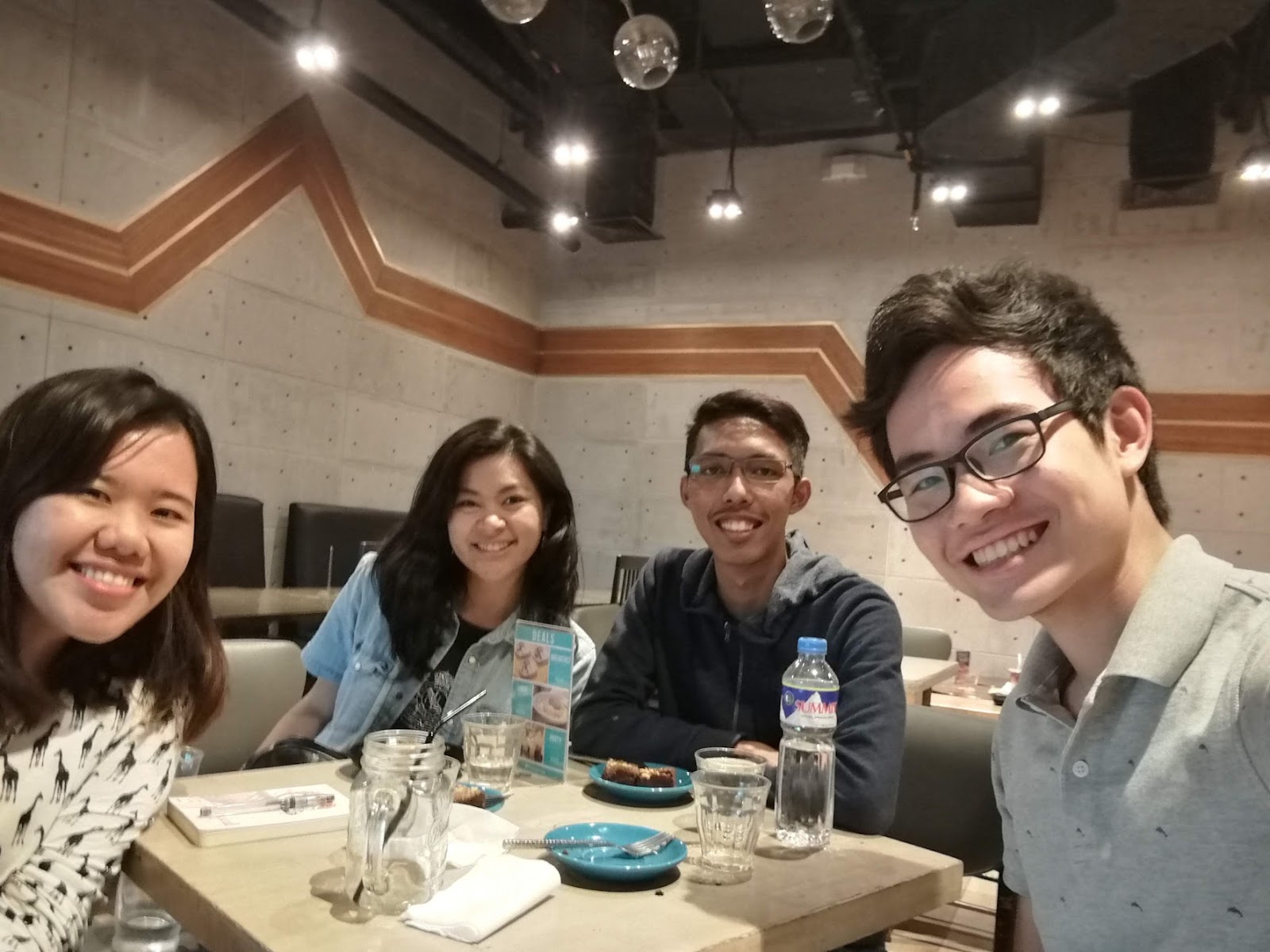
When we started, we had three main goals:
1. To increase awareness about EA in Manila
2. To build a friendly community for people interested in EA
3. To get Filipinos to increase their involvement in or donations to EA’s top cause areas
We’ve mostly been successful at the first two goals, but we aren’t satisfied with our progress on the third. We'll talk more about that towards the end of the post.
Key Outcomes in 2019 (our 1st year)
1. We’ve now identified 11 contributors and 7 participants in our local community (including us four core team members). We classified them based on CEA's Concentric Circles Model and our evaluation of where they fit in the funnel.
2. Around May 2019, we successfully applied for a general group funding grant from CEA, which allowed us to fund our operations from May to December 2019. Later, we successfully applied for a grant that covers January to December 2020.
3. In 2019, we held a total of 14 events - usually doing one per month. We now average 20 attendees per event, and we get an average of four “repeat” attendees per event (not including us co-founders).
4. We've been able to partner with the local offices of EA-recommended organizations such as Oxfam, Innovations for Poverty Action, and IDInsight, and have representatives from their orgs speak and attend our events.
5. We've also met or had calls with members from various EA communities, such as EA Singapore, Toronto, Montreal, Norway, and London, and with members of EA organizations, such as GiveWell, LEAN, CEA, Rethink Charity, and The Life You Can Save.
6. 5 student members of EA PH started a chapter named EA Blue at the Ateneo De Manila University in August, and they recruited 60 students to join their chapter.
On Organizing Events
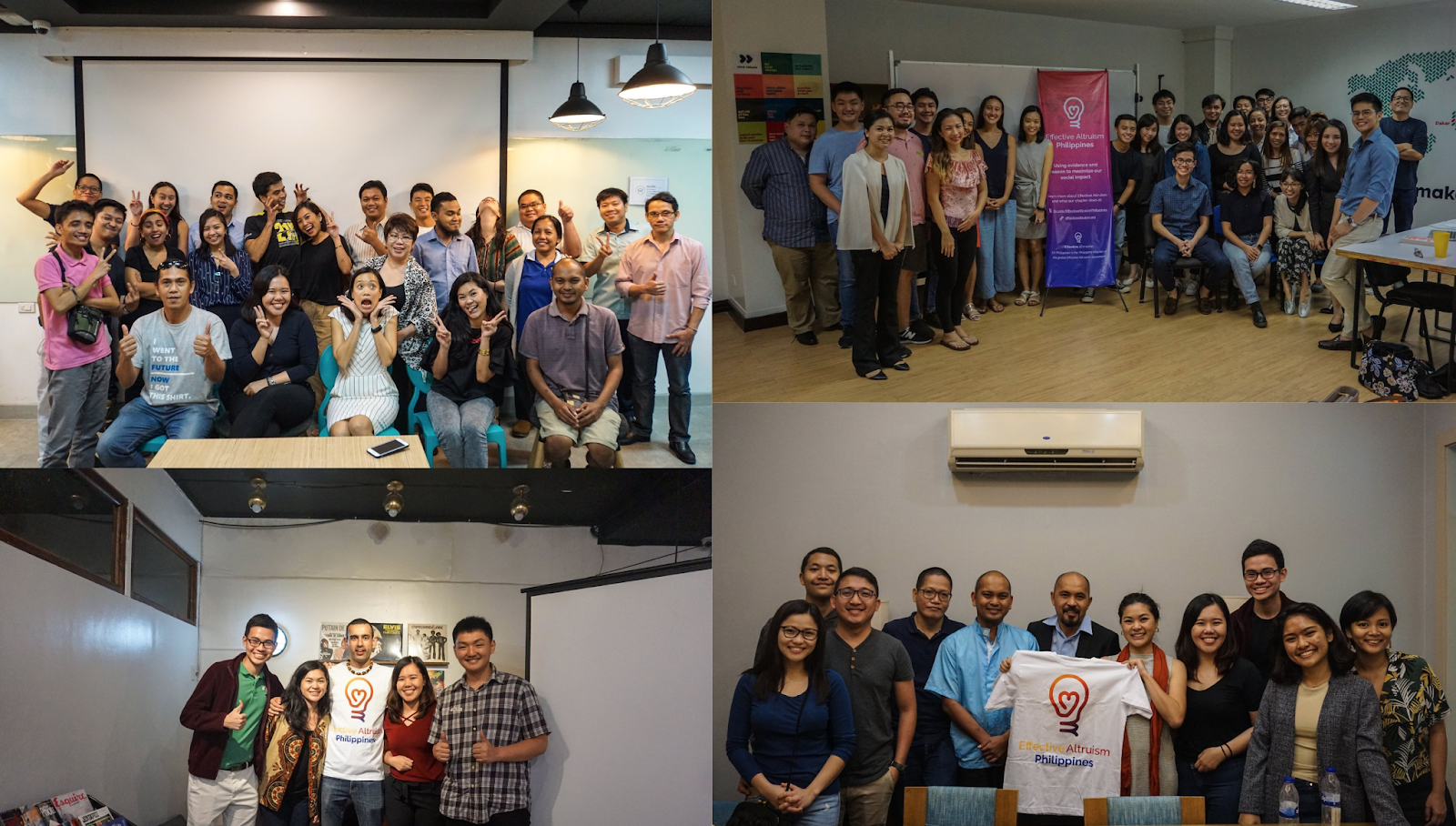
When we started, we didn't know anyone else in Manila who was interested in EA. We were all fairly new to the movement. As such, we decided to focus on holding monthly events in order to spread awareness about EA and its various facets and cause areas.
We worked on EA PH part-time, on top of our day jobs. At first, we were paying for expenses out of our own pockets. Thankfully, we got funding from CEA to fund our events from May to December 2019.
This table includes information on all the events we’ve held so far:
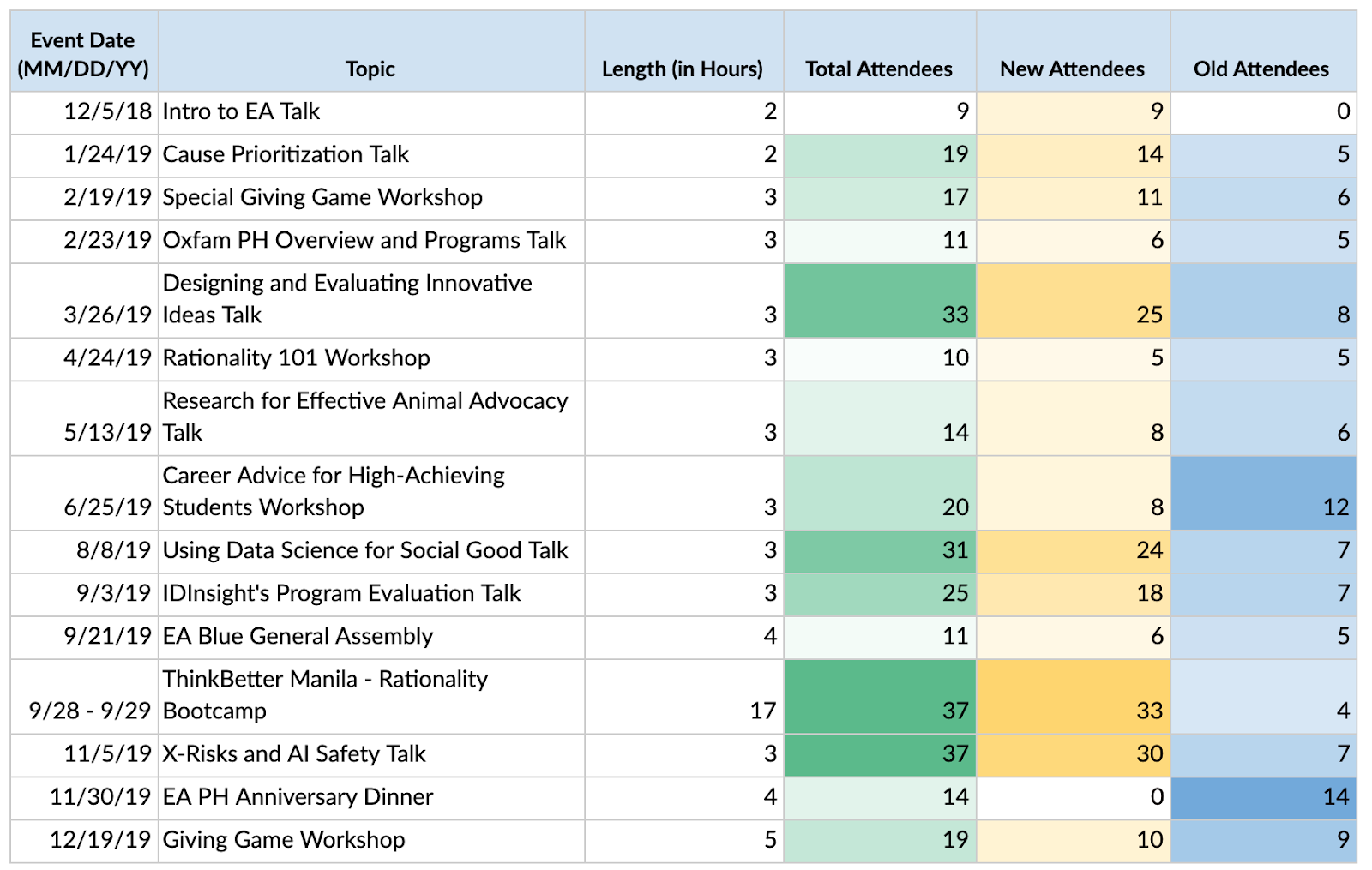
To explain some things about the table above:
- The March 26 talk was given by Yuna Liang, a Senior Research Associate at Innovations for Poverty Actions Philippines. It focused on how IPA helps design and evaluate interventions, such as through randomized controlled trials.
- The EA Blue General Assembly in September was the first event of EA Blue, our university chapter. They introduced their members to effective altruism and explained what their plans were for the year. EA Philippines’ core members also gave talks at the event.
- The ThinkBetter bootcamp in September was a 2-day rationality and critical thinking workshop we organized. The bootcamp’s instructor was Naryan Wong, co-founder of ThinkBetter. Naryan is an EA from Toronto, and he agreed to come to Manila to teach 2 full days of sessions on rationality concepts and techniques.
Here's a bar chart that shows how many people attended each event:
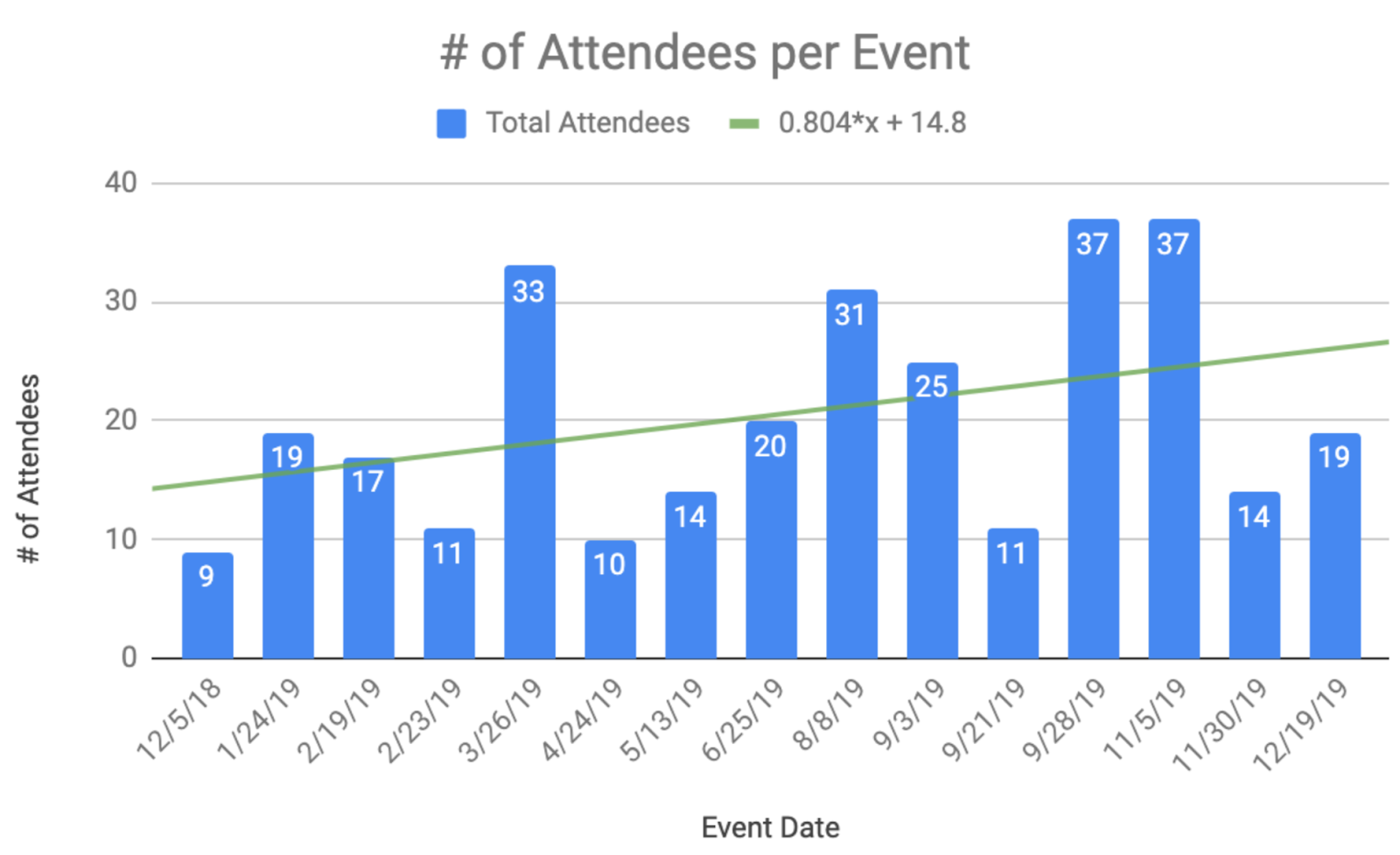
We've organized 15 events since we started, and 207 different people have attended at least one of them. Most of the events had the same format:
- 30 mins for people to arrive and get food
- 10-15 mins of introductions / icebreakers
- 1-1.5 hours for a talk by a speaker, with Q&A
- 20-30 minute Intro to EA and EA Philippines by one of us co-founders
- ~30 minutes for networking and egress at the end
How We Got Attendees
When we held our events in the venues of reputable local organizations, this seemed to let us attract more attendees to come. These venues include MakeSense (a co-working space for social entrepreneurs), QBO (a popular co-working space for startups), and Thinking Machines (the leading data science consultancy firm in the Philippines).
We marketed the events on Facebook, posting on our timelines and sharing to a few Facebook groups that were related to the event. It also helped that some of the organizations of the speakers we invited, or our venue partners, would post about the event on their Facebook page.
Moreover, because Filipinos are quite active on Facebook and social media in general, it’s probably easier to find interested attendees in Manila than in other countries. It also helped that we got reputable speakers from the local offices of EA-recommended organizations, such as Oxfam, IDInsight, and Innovations for Poverty Action.
Who Came to Our Events
In organizing these events, we’ve realized how altruistic and willing to help some Filipinos are. Problems like poverty, climate change, and natural disasters are more salient to the average Filipino than the average person in a developed nation, so people attending often have a familiarity with these problems, and they have a natural inclination to help solve them.
In our first two events, people who attended were mostly either interested in or part of the development sector. And since we partnered with local development organizations like Oxfam and Innovations for Poverty Action, we attracted a lot of people part of the local development sector to come. But we were also able to organize events that attracted people from the animal welfare / vegan community, people from the AI and data science community, and students from top universities.
Out of all the events we organized above, we’d say our most successful ones, which had a lot of attendees and introduced us to some of our most active/engaged members, were the following:
- Innovations for Poverty Action (March)
- Two-day ThinkBetter Rationality Bootcamp (September)
- X-Risk and AI Safety talk (November)
High Conversion Rate of Facebook Ads
We ran Facebook ads on almost all of the events to attract more attendees to come, and they were very cost-effective for us. For $20-40, we could get an extra 10-30 attendees to come. We measured this by having people sign up through a Google Form and telling us how they found out about the event.
I would make a poster for each event using a template I made, and I or a core member would make sure to write good copy in the description for each event. We usually created a custom audience with its own interests and demographics to target for each event.
Below is an example of a Facebook ad we ran for an X-Risk and AI Safety event. This was one of our most successful ads. With just $21 spent, 276 people clicked “interested” and 36 people clicked “going” on the Facebook event. 60+ signed up on our registration form, and 37 people showed up on the day itself.
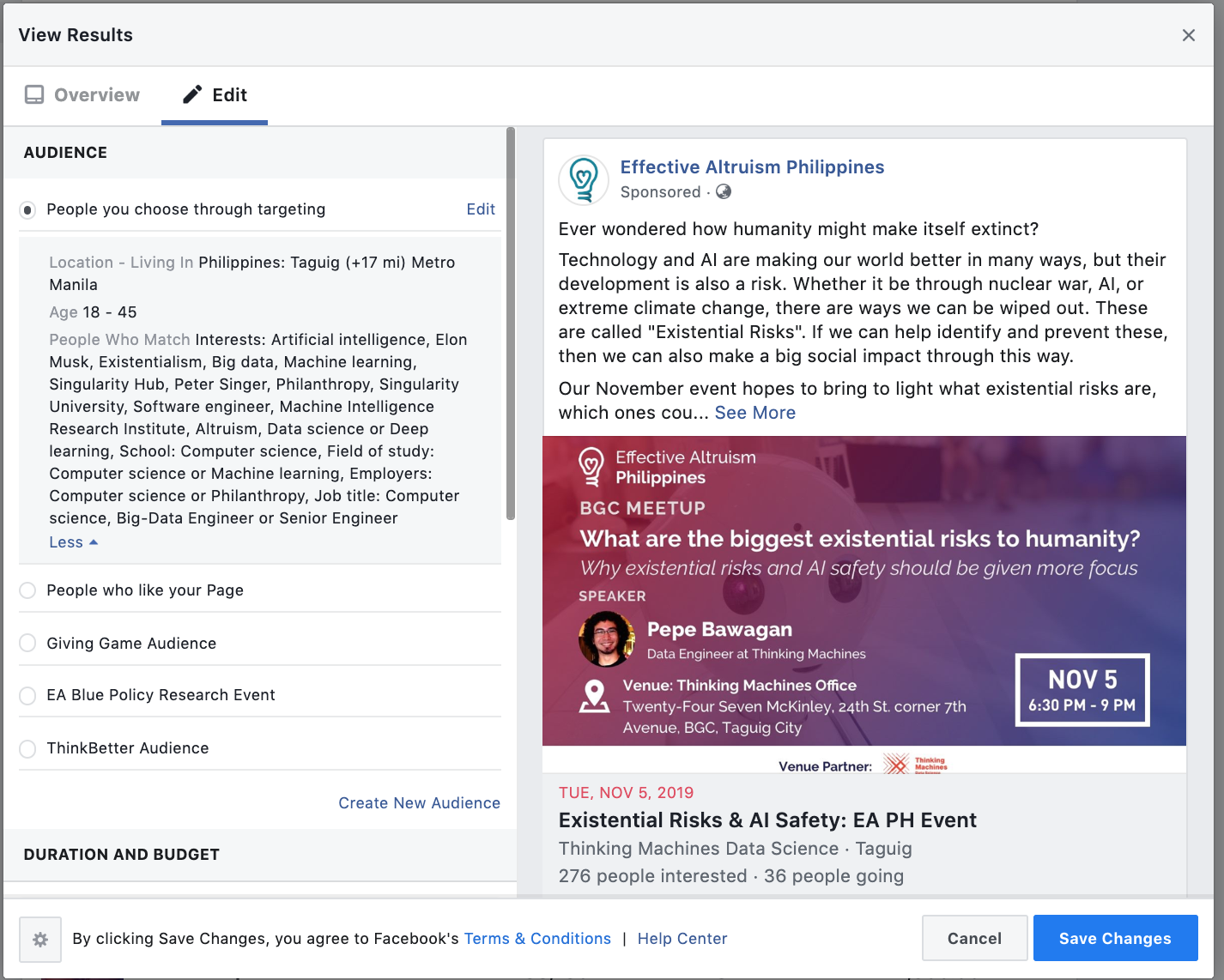
As seen above, we made sure to target people whose interests match keywords related to Effective Altruism or AI
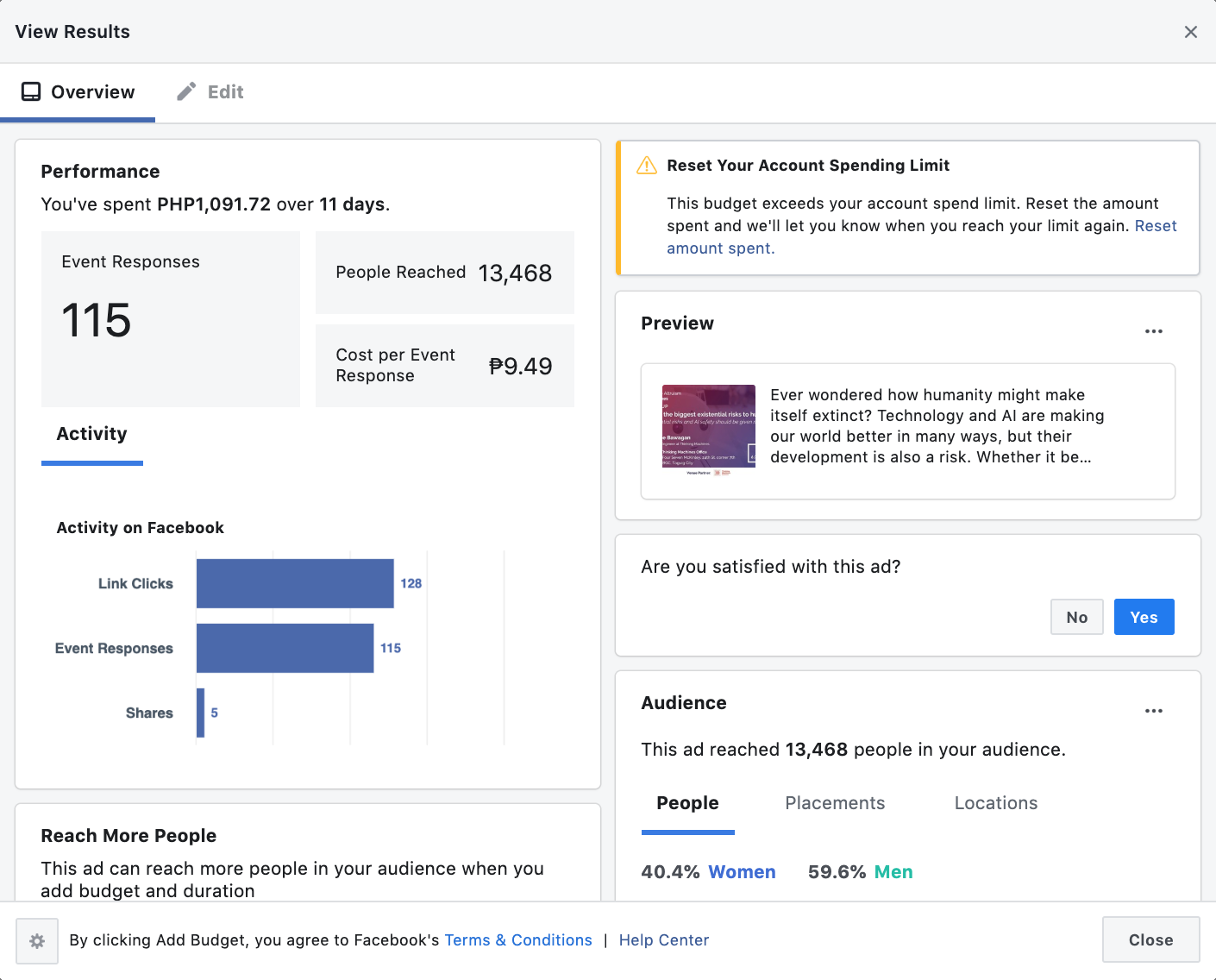
Our cost per attendee using FB ads was around $1-5 per person, depending on the event. Generally, we liked the type of people who came to our events - they were friendly and open-minded. However, only a few of them would be truly interested in EA and be willing to get more engaged in it. In 2020, we still expect to use FB ads, but we know to expect that only a handful of them will be the ones that will truly be engaged and interested in EA.
Getting Event Feedback
Whenever we were able to have people fill up a post-event survey or tell us their experience, we’ve gotten largely positive feedback. We’ve compiled feedback from 8 of our events here in this Google Sheet.
For some of our events, our feedback forms were printed and filled up by hand, while for other events, we used Google Forms. We transcribed most of the handwritten feedback, but our plan from now on is to use Google Forms as much as possible, since transcribing the feedback takes up time.
We used and printed out the “EA Event Feedback Form” found in the EA Group resources Google Drive for our first few events. However, when we wanted to use Google Forms to avoid having to transcribe, we altered the questions to try getting more specific feedback.
Moving forward, we now realize the importance of having a standardized set of post-event feedback questions, so that it’s easier to compare ratings and feedback between different events. However, we may also include a few event-specific questions in these forms in the future.
Learnings from Positive Feedback
Some positive feedback that we received early on included the following:
1. Good food/snacks
We served vegan food in our first few meetups, and we were unsure if participants, who were almost all not vegan, would like the food. But a lot of them were okay with eating them, and some really liked them! As such, we made sure to include a budget for food for all future events of ours, and we’ve continued to serve only vegan food in all of our events.
2. Fun Icebreakers/Introductions
At the start of every event, we either have each person introduce themselves to the room, or we play an icebreaker. If we’re doing introductions, everyone says their name, occupation, how they heard about our event, and a fun fact about themselves. From time to time, we organize a fun icebreaker if we feel we have enough time for it, and participants enjoy this a lot. We call this icebreaker “The Clock Game”, which we have a guide to organizing here. Basically, we make participants repeatedly pair up with a different person in the room and do a random task with them, such as the following:
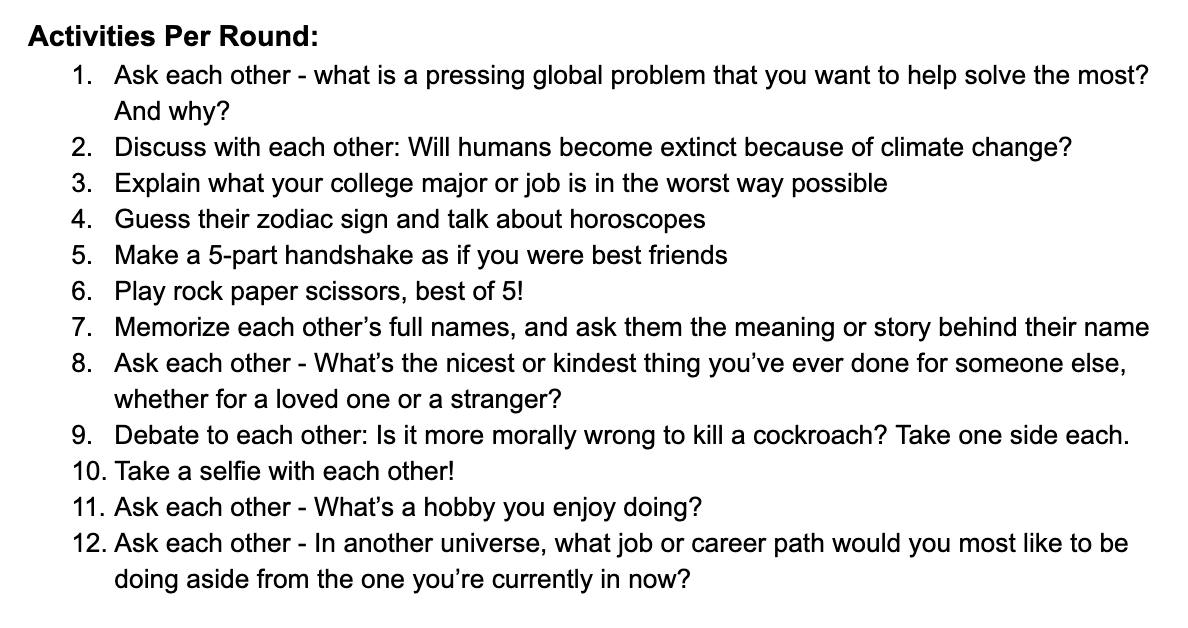
3. Having an Introduction to EA in every event
In almost every event, one of us co-founders would spend 15-25 minutes introducing what Effective Altruism is. He/she usually introduces the ITN cause prioritization framework, gives a background of how he/she found out about EA and helped start EA Philippines, and shares reasons to be part of the EA community.
We got feedback early on from some participants that they liked this introduction, but some were also confused on what EA really was. As such, we’ve continuously refined and improved the talk’s content and slides. Here are the slides of one of the latest versions, where I was the one giving it. We also have a video of the talk on YouTube. After this talk, one of the attendees, whom we hadn’t met before, gave this review on our FB page, which we were pleasantly surprised by:
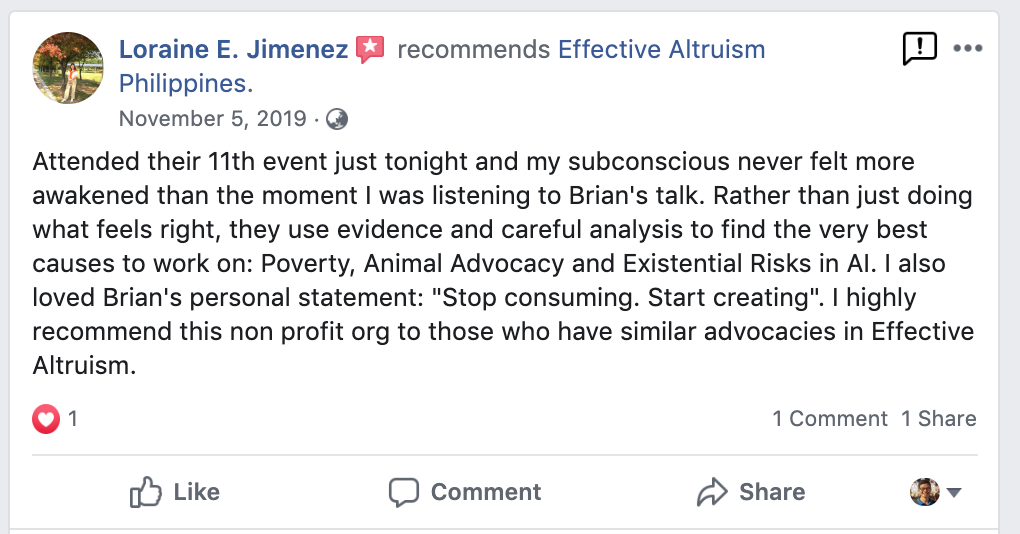
Negative Feedback / Suggestions
Meanwhile, here were some suggestions or points for improvement from the feedback we got:
1. Venue size, location, and conduciveness to discussion
Our first few events were held in small venues (fitting 10-20 people), and participants felt quite cramped. Now that we have funding from CEA though, and because we’ve been able to get venue sponsorships/partnerships, we’re able to reserve bigger venues that are more conducive to discussion. We’ve learned from participants that finding a good venue with a good ambience is important.
Some participants prefer we hold events nearer to where they live/work, especially given how horrible Manila traffic is. But we’re unable to please everyone with where we locate our venues. For now, we mainly hold events in Makati City or Taguig City, but we may also hold events in Quezon City or Pasig City from time to time. Some participants also prefer we hold events on weekends, but most prefer them to be on weekdays.
2. Lack of research on recommended charities in the Philippines
We regularly receive questions about whether EA Philippines does any research on which local charities to recommend donating to. Some participants still see EA as a “Western” concept/philosophy. They think that based on EA’s top cause areas, it recommends people to help solve problems of the world or problems in countries poorer than the Philippines. However, some of our participants believe we Filipinos need to help our own country first, given that we are a “Third World” country.
Although we’ve considered doing research on highly-effective charities to donate to in the Philippines, we don’t plan on working on this in the near future because of how difficult it would be to do so. We would also like to help people change their mindset and be more open to other pressing global causes, aside from just local poverty and other local issues.
For now, we recommend either EA-recommended organizations abroad, or the EA-recommended charities that have local offices, such as Oxfam, IPA, and IDInsight. However, Tanya and Kate are thinking of ways where we can partner or work more closely with other charities in the Philippines, to improve or prove their cost-effectiveness.
We also have 2 community members working on compiling a list of vetted local charities. However, the charities on their list are mostly already reputable local charities, and they are not currently assessing charities based on cost-effectiveness.
Helping EA Blue
Around May 2019, we were able to get five student attendees of EA Philippines to found a university chapter in the Ateneo De Manila University, one of the Philippines’ top universities. The chapter’s name did not include the school’s name (such as EA Ateneo) because new student organizations in Ateneo can’t use the school’s name until they’ve gone through an accreditation process. We named it EA Blue since Ateneo’s school color is blue.
EA Blue was able to recruit 60 students to sign up for their organization in August. 60 seems like a lot, but in Ateneo, students just sign up for multiple organizations without really committing to be active in them.
We helped EA Blue by organizing two events in partnership with them. However, they have not had much progress for their chapter. Most of their founding members are also involved in other organizations and are not fully focused on EA Blue. EA Philippines will see what it can do in 2020 to help support EA Blue become a more effective chapter.
The lesson here is that student chapter leaders need to have strong commitment, but they may also need some guidance and management from older community builders. We weren't able to guide or manage them as much as we'd like to, so we may do this more in 2020.
Other Progress
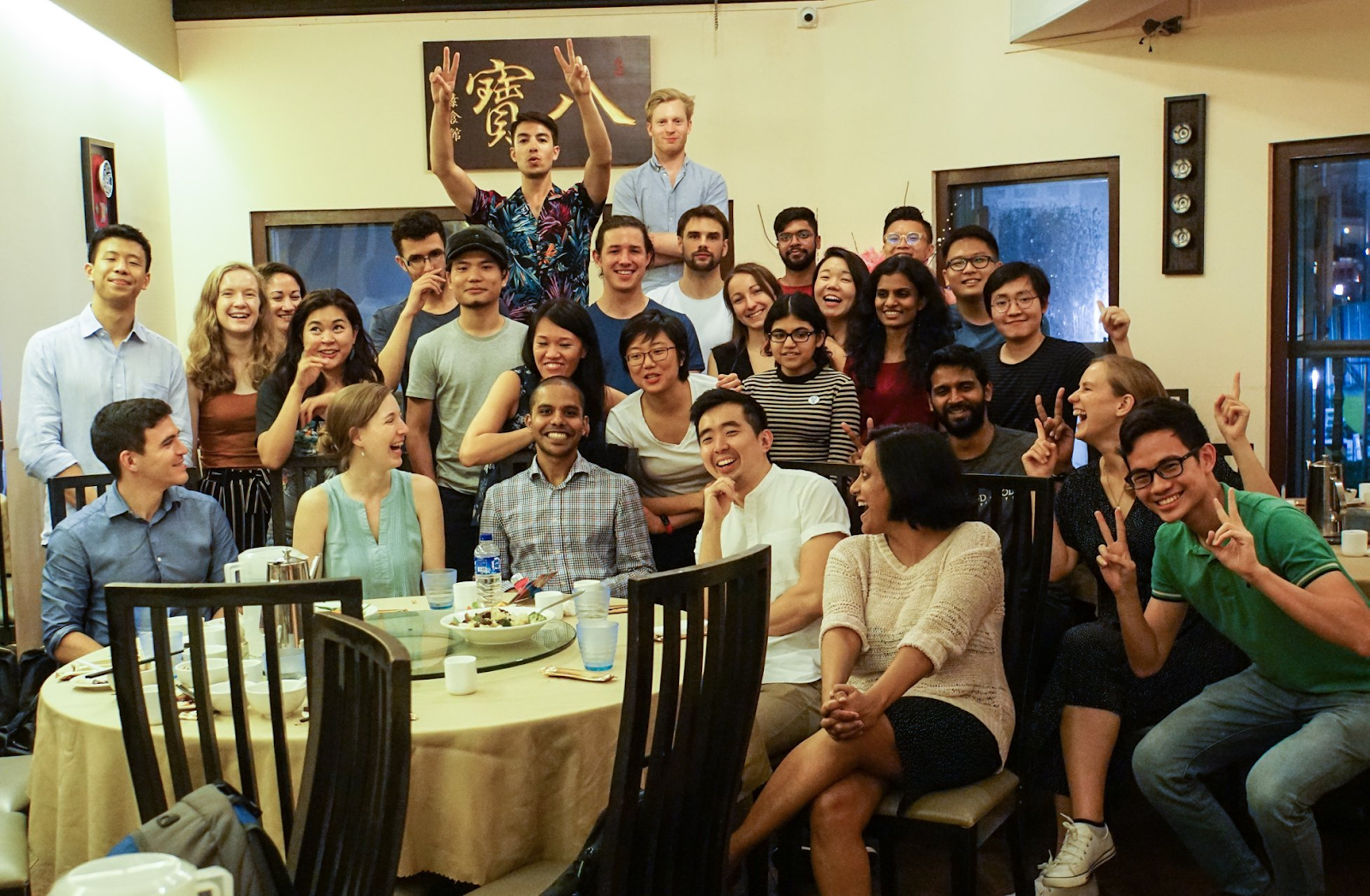
Photo of our dinner with speakers and community builders in Singapore
Tanya and I attended the Doing Good Better Conference and EA Asia Retreat in Singapore in October, and we learned a lot there. Kate was also featured in Jah Ying Chung’s talk in the conference that highlighted how EA Philippines grew fast in less than a year.
We've also been able to participate in a national Monitoring & Evaluation (M&E) Forum, organized by the National Economic Development Authority (NEDA) and the United Nations Development Programme.
Multiple monitoring and evaluation practitioners across sectors came to the event to hear from professionals in the government, non-profit, and for-profit sectors. Kate was a panelist representing EA Philippines, and Tanya had been the forum's moderator. EA Philippines was introduced to 366 attendees of the conference there.
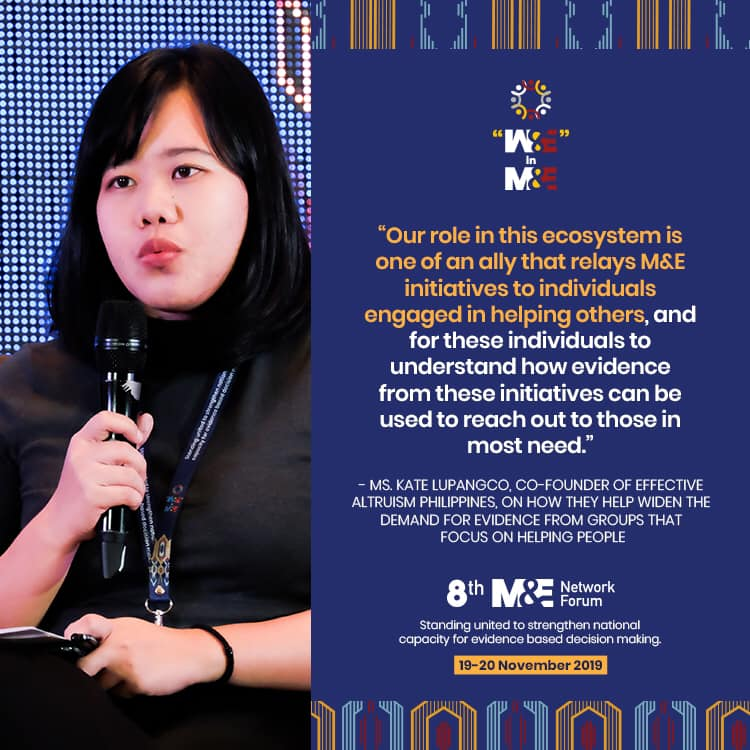
A poster featuring Kate was posted on Facebook by NEDA
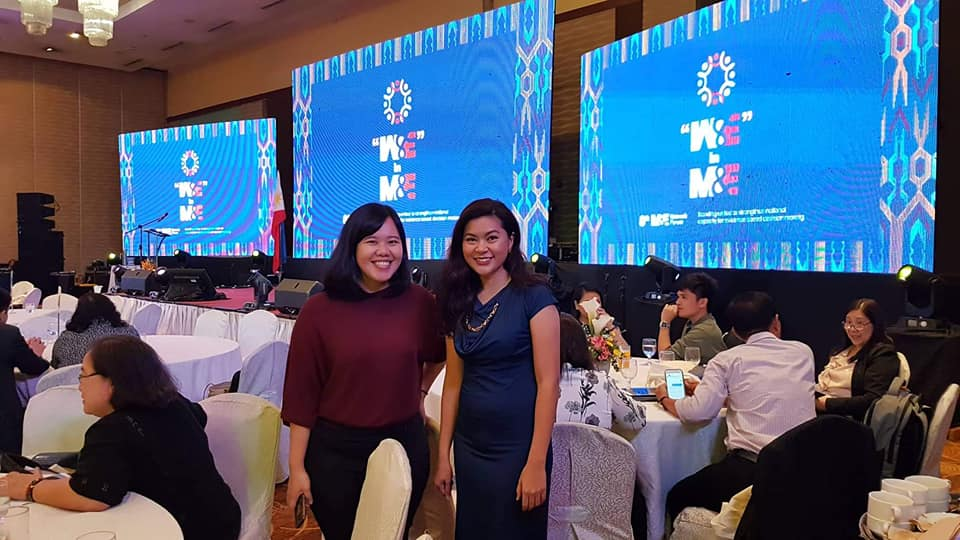
Photo of Kate (left) and Tanya (right) at the M&E forum
Lower than Expected Costs of Operations
From May to December 2019, EA Philippines received a grant of ~P123,000, or about $2,400 USD (after transfer and conversion fees) from CEA. During that period, we only spent P82,000, or $1,600 USD. From Dec 2018 to April 2019, when we didn’t have a grant, we only spent around P20,000, or about $400 USD.
That’s a total of $2000 USD for a year’s worth of operations. We don't know if this is more or less than what other groups spend in a year, but we think this money was very cost-effectively used. We were able to not spend the entire budget given to us since we were able to get venue sponsorships and food sponsorships at times.
For venue sponsorships, we were lucky to get in contact with someone from MakeSense, a global community of social entrepreneurs. They give us a generous discount on organizing events in their co-working space. For food sponsorships, Kate reached out to local catering services that serve vegan food. Two of them were happy to sponsor some food for us, provided we took pictures of the food and posted about it on our Facebook page. We also earned some profit from the Rationality Bootcamp that we organized, which we did not expect to earn profit from.
Other Community Building Activities:
Aside from organizing events, we also did three other community building activities.
The Value of Doing 1-on-1s
The first was conducting 1-on-1s, with the hope of getting new members more engaged and interested in EA. We've held 22 1-on-1s with people from Manila in 2019, most of them in the latter half of 2019. So far, 1-on-1s seem to be a good way to help people we know become more knowledgeable and engaged in EA.
The Value of Socials
EA PH also conducted its first "Socials" event on Nov. 30 2019, and we invited some of our most active members to come. 15 of us gathered for an informal dinner with icebreakers and drinks. We also presented EA PH's progress in the past year, and asked participants for feedback and suggestions on how EA Philippines can improve and grow more. It was a really fun event, and we think that community builders should try to organize a couple of them a year. We hope to organize two or three socials in 2020.
The Value of Books
Lastly, for Nov. and Dec. 2019, we decided to request from CEA a change in how we would be using funding for those last 2 months of the year. Since we had quite a lot of money saved up, we wanted to spend some to buy EA-related books and raffle or lend them out. We raffled off 2 books, before finding out from CEA that they would prefer we just lend them out. We agree with that plan, so we started lending out the books.
We now have 2 copies of Doing Good Better, and 1 each of The Most Good You Can Do, The Life You Can Save, and Superintelligence, with a copy of 80,000 Hours Career Guide and Poor Economics coming as well.
We had friends from the UK/US buy these books for us and bring them here, since most of them are not available in Manila. So far, 8 different people have borrowed and read at least one of the books, and we think they're a great way to get people educated about EA without us having to do it ourselves.
Still Lacking Deep Engagement?
In applying the Concentric Circles / Funnel Model to our attendee database, as of Dec. 2019, we’ve identified 11 contributors, 7 participants, 185 followers, and 175 audience members. Below is a chart showing this breakdown.
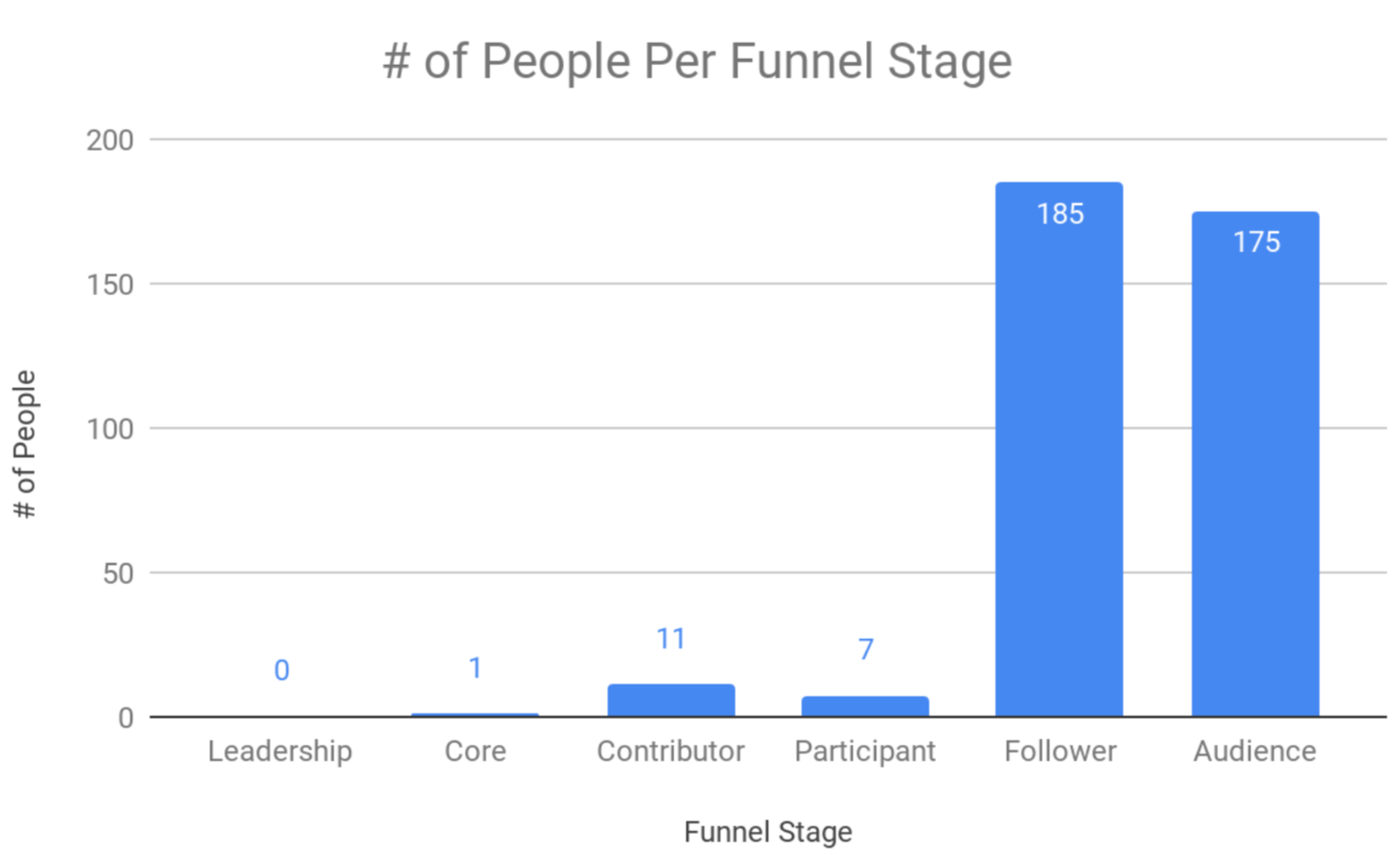
“Audience” members are people who registered for one of our events, but ended up not showing up.
“Followers” are people who’ve attended at least one of our events, find the ideas plausible, but don’t seem to be that interested in Effective Altruism. Participants are those that have attended more than one event, understand EA’s core ideas, and seem to be more interested in it, such as through their willingness to schedule a follow up 1-on-1 with us.
Meanwhile, contributors are those that are either part of the EA Blue or EA Philippines core team, and/or have attended our events numerous times. We co-founders count ourselves only as contributors, and not yet as core members. There's 1 core member in the chart above since we had an EA from abroad come to one of our events, and he lives in the Philippines a few months every year.
We can see that only 19 people in our community have become more than just a follower of EA, and we are looking to see how we can either find more engaged people, or get people more engaged. To do this, we are re-assessing our community building strategy. We’ll potentially focus on more targeted outreach and do more 1:1 meetings with people in our community.
In Conclusion
All in all, EA Philippines has grown relatively quickly in just a year. Nevertheless, we would like to find more people who become truly interested and engaged in EA, and to help our members become more engaged. Ultimately, we’d like to see members maximize their positive impact in life in accordance with EA principles, so we’d like to see our members do one or more of the following:
Learn more about EA and its cause areas
- Consume more EA-related resources, to learn more about what EA is and about its various cause areas
- Attend an EAG or EAGx conference
- Read the EA Forum and participate in it
- Connect with other EAs, here or abroad, to learn from them (We want our members to feel they are part of the global EA comunnity, not just the EA PH community)
- Take a promising undergraduate or graduate program in a university abroad that would prepare them for one of 80,000 Hours’ priority paths, such as AI Safety
Spread awareness on EA and/or earn-to-give
- Help EA Philippines in organizing EA events and/or spreading awareness about EA in the Philippines
- Starting a sub-chapter in their local area or university
- Increasing awareness about EA in local non-profits / development organizations
- Donating or pledging to donate a portion of their income to EA-recommended charities/organizations
Do impactful, EA-aligned work
- Work locally, remotely, or internationally for an EA-related organization
- Do freelance, volunteer, or part-time work for EAs and/or EA-related organizations
- Take on a project (i.e. research project) that contributes to EA knowledge / research
It's quite hard to get people in the Philippines to become more engaged in EA, but we think we can still make more progress. However, us co-founders also have to assess whether community building in the Philippines is the most valuable use of our time, as EAs ourselves.
Figuring out what to do for 2020
From initial talks and plans we’ve made, we plan on organizing half the number of events we did in 2019. Instead of doing 15 events, we plan on doing only seven, with five as talks/workshops, and two as socials-type events. This is mainly because each event takes up a lot of time and effort to organize.
We’d also like to prevent burnout, as well as have more time to do 1-on-1s. Hopefully, this also means that the events will be of higher quality and would have more in-depth discussions, especially if the people coming are repeat attendees who know about EA already.
For 2020, Kate and Tanya still plan on devoting as much time as they did in 2019 to growing EA Philippines. Meanwhile, I may cut down between 10-40% of the time I spend on EA Philippines. This is due to various reasons, including realizing that 15 events per year is a lot, wanting to lessen repetitive EA community building work, and exploring other options to make an impact. (Update, June 2020: I ended up not cutting down 10-40% of the time I spent on EA Philippines. In fact, the time went a bit up. Thanks to EAG SF 2020 and other factors, my motivation to do EA community building work increased, and I've been enjoying my time spent on EA Philippines a lot this year!)
All three of us are interested to work directly for EA-related organizations in the future, so that may mean we spend a lot less time on EA Philippines in the future. This is something we'll have to consider doing if we think it will maximize our impact and happiness.
Anyway, we hope community builders and EAs learn new insights from this post. I hope other community builders will also post about their progress and challenges in 2019, since community builders and EAs should learn a lot from these.
I believe there’s a lot of value to doing EA community building work, and I hope this post inspires others to start or continue doing community building work, especially in emerging markets like the Philippines. Feel free to ask us any questions in the comments below!
Thank you to Kate Lupango and Tanya Quijano for helping with the article, and to Aaron Gertler, Alex Barry, Florent Berthet, and Colin Bested for proofreading and providing feedback.

Thanks for sharing this write-up, I really enjoyed reading it! It sounds like you've made really solid progress for a new group, and seem focused on the right priorities, especially helping your members to learn more and become more engaged. You mentioned that there's a chance that you might decrease the amount of time you spend on community building in the future; I'm curious whether you have identified any successors who might take on some of your work? I've noticed that succession planning is plausibly one of the most important things group organisers can do, as it ensures the continuation of their group going forward.
Hi Katie, thanks for the feedback and question! We're definitely thinking about succession planning and finding additions to or replacements for our core team. But we have yet to identify clear candidates who would be willing and are a good fit to be community builders. We do have active members though, and we would like to see one of them expressing interest to be part of the core team.
In the meantime, we can't really spend much time working on succession planning. We'll focus on it when we're more sure that we will move on to other paths instead of leading EA Philippines. We all still plan on being in the EA Philippines core team through the rest of 2020, and some of us are still willing to be in the core team for 2021 if we don't have successors.
Anyway, our plan for 2020 is to be on the lookout for people willing to join our core team, and to guide or train them once we find one or more of them.
Also, just for some background on EA Philippines' core team, we're composed of 4 people - Kate Lupango, Tanya Quijano, Alec Wang, and myself. Here's some more information about us:
Our other co-founder, Jeffrey, gradually became less involved after the first few events.
You can reach out to me via a Forum message or to us through our Facebook page. I can connect you with anyone from our core team!
Wooh! Thank for this BrianTan, this will be very helpful. We hope other community builders can share their own experience.
Thank you so much for documenting your experience growing EA Philippines from its start on the forum! This was super helpful and provided extremely relevant info for us. I'm helping the nascent EA South Korea and we're trying to increase engagement in the group here by holding regular meetings and and having some core EA content translated into Korean to make EA more accessible to Koreans.
I have some questions if you wouldn't mind answering if you can find the time (and if you can still remember :P)!
was: https://www.effectivealtruism.org/groups-mentorship-and-funding
now: https://www.centreforeffectivealtruism.org/group-support-funding
Hey Mike, thanks for the kind feedback, and thanks for helping EA South Korea! I can answer your questions:
I now work for CEA as a group support contractor, and I process group support funding applications. EA South Korea can apply for group support funding from CEA for any expenses within our common expense guidelines.
Thanks for answering my questions and the links! The additional info is much appreciated :D
We'll be submitting an application for group support funding in the coming weeks, so keep an eye out for it!
Mind if I bug you to answer my 5th question too? We're planning on having a monthly social gathering, so I'm wondering if you found there to be any downsides to having them more regularly.
5. Why did you have so few general social meetups?
No worries, and I'll keep an eye on it! Sorry, I missed out on your last question. During our first year, I think we viewed EA Philippines as a serious organization trying to market EA via well-run events (i.e. with speakers), rather than as a small, tight-knit community. Moreover, it was only in November that we started to feel we had enough regular attendees (i.e. 15-20) to organize a socials.
Looking back, we could have done one or two more social meetups that year. I only say one or two because I think other types of events (especially discussions of EA readings, like for an intro fellowship) are generally higher value than socials. I see higher value in socials now than in our first year, although Manila traffic can make it hard for people to meet in-person. I think it's fine for your group to have a monthly social gathering.
Thanks again Brian! Again, quite helpful to hear your perspective :D
We had a bit of a strikeout with our first social meetup last week with 0 attendees aside from the organizers XD It may be this was a fluke, but it also may be that until the group's better established and members have built up relationships with each other, more structured structured meetings will draw more people in.
We'll see what happens at our discussion group next week! :D
I see, yeah you might get better attendance for social events when the group is more established and has more regular members!
Thanks for posting, I really enjoyed reading this. Great work!
Thanks Ollie!
For community builders reading this, we'd also like to know what other communities' funnel metrics look like, to see whether if ours is typical or not. I'm curious to see how other communities measure and track their members' engagement, and what the levels of engagement look like.